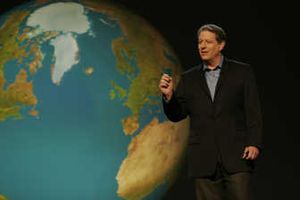Gregoire pushes ahead with anti-global-warming proposal; rural lawmakers call it “fanatical”
Interesting exchange this morning between rural Republican lawmakers and state Department of Ecology head Jay Manning, who was describing Washington's participation in the Western Climate Initiative, which targets global warming.
Rep. Joel Kretz, R-Wauconda, is one of several rural lawmakers who are extremely leery of the proposal. He doesn't want Democrats' big focus on "green jobs," he said, to come at the cost of blue-collar jobs.
Manning suggested that the risk of global warming to the region's forests -- increased insect damage is widely believed to be due to warmer winters -- will hurt Kretz's constituents more than anyone.
"The fire risk we will be facing is very different and very much greater than anything we've faced before," said Manning.
And he suggested...
that carbon offsets, like planting trees to capture and hold carbon dioxide, could dramatically help rural communities like Kretz's.
Launched two years ago by five governors, including Washington's Chris Gregoire, the proposal is a "cap-and-trade" plan designed to cut greenhouse gas emissions in the West and four Canadian provinces by 15 percent by 2020. (The benchmark is 2005 levels.)
Under
a cap-and-trade plan, regulators set limits on the pollution, but then
let companies and others trade "allowances" that would, well, allow
some to emit more gases than they otherwise could. Some limits would
start in 2012, others in 2015. See here for more.
What's covered: electrical generation, fuel burning, factory emissions, gas and diesel emissions, and residential fuel use.
At this morning's hearing, Rep. Ed Orcutt asked what's being done about developing nations and places like China, which has a large number of carbon-belching coal-fired plants. Manning acknowledged that "they are a big source" of pollution, and said leaders have to keep pressure on those companies to act as well.
Rep. Hans Dunshee suggested that
Manning give lawmakers details on global-warming problems like bark
beetle damage, "plus a list of businesses who get it" and support the
proposal.
"I think you might calm the angst," Dunshee said.
Rural lawmakers are clearly worried about the cap-and-trade plan Gregoire is promoting.
"...Washington state accounts for only three-tenths of 1 percent of global greenhouse gas emissions," said Rep. Shelly Short, R-Addy, said in a press release. The state relies heavily on clean hydropower, she said, and shouldn't risk its economy on an unproven plan that would burden businesses.
"We should be doing everything we can to help employers create and retain jobs, not placing more obstacles in their way," she said. Short's trying to rally local residents to dissuade Gregoire from pushing ahead.
In a nearly identical press release,
Rep. Joe Schmick calls the plan "an economic slash and burn for this
state" and "environmental fanaticism."
"In my opinion, there are some very fanatical ideals being bantered about by a very vocal minority," said Schmick, R-Colfax.
UPDATE: Advocates have a new name for it, apparently. Now it's "Cap and Invest."
